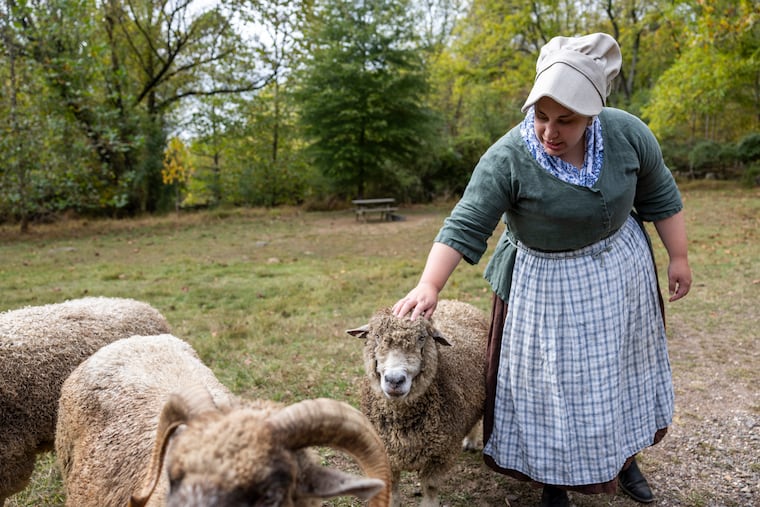Copyright The Philadelphia Inquirer

Drive into Ridley Creek State Park through the gold October foliage and around the sharp turns of Sandy Flash Drive, and you’ll find yourself in the past. That is, of course, if you’ve arrived at the Colonial Pennsylvania Farmstead, a five-decade-old museum and working farm that uses hands-on learning to teach visitors about everyday life in colonial Pennsylvania. “Here at the Farmstead, we allow you to connect with the past through the act of doing,” said Sarah Lerch, the farmstead’s executive director, donning a linen dress and bonnet on a recent afternoon. Lerch is one of a handful of staff and volunteers who breathe life into history each day at the farmstead, teaching tour groups about the colonial farming family. Visitors make candles, harvest root vegetables, cook stews over the fire, and tend to the chickens, horses, oxen, and other animals that commune on the 112-acre property. As Lerch describes it, there’s “the relevance and the empathy and the connection that you can have to people in the past” from doing the chores or eating dishes they did. Over the past five years, the farmstead has ramped up efforts to expand its teaching of history, including talking about slavery and the four individuals who were enslaved on the farm: Peggy, Cuffy, Susanna, and York. In December 2024, the farmstead was approved for a $25,000 grant from the National Endowment for the Humanities to help uncover the stories of enslaved people in Southeastern Pennsylvania. Four months later, under directives from the Trump administration, the National Endowment for the Humanities canceled nearly all of its grants, including the farmstead’s project. The agency said it was rescinding funding for projects that were “at variance with agency priorities,” including those on diversity, equity, and inclusion, and environmental justice. The farmstead found out through news reports, and its repeated inquiries to the agency about the grant were never returned. Now, the museum is working to tell the full story of the Delaware Valley’s colonial inhabitants in a landscape marked by shrinking funding opportunities and growing scrutiny over teaching the history of American slavery. Telling the “everyday person’s” story The origins of the Colonial Pennsylvania Farmstead date back to the mid-1960s, when Pennsylvania purchased 2,490 acres of farmland in Edgmont Township to create Ridley Creek State Park. Around the same time, a group of locals banded together to protect the old houses within the park, including an abandoned farm that would become the farmstead. With public and private funding, land was cleared, archeological research was conducted, and livestock were procured. The Colonial Pennsylvania Plantation, as it was named, opened to the public for the bicentennial in 1976. The “ordinary” is part of what makes the Colonial Pennsylvania Farmstead so extraordinary. In a region carved by historical giants — George Washington, William Penn, Benjamin Franklin — the life of the everyday farmer is often lost to history. During the Revolutionary War period the vast majority of colonists in the Delaware Valley tended quietly to farms, raising livestock, soaking flax, and cooking over open flames. “Not everyone can relate to a George Washington, or even a Martha Washington,” Lerch said. “Those names are really important in history, but so is the everyday person.” The farmstead is a sprawling ecosystem of agriculture and education. In its crop fields lie flax, broom corn, wheat, rye, barley, and potatoes. Its smaller kitchen garden is home to herbs, dyes, squash, peppers, and Lenape beans. There’s the main house, a stone cabin housing textile equipment, a bird coop, an educational programming building, and two barns. Sarah Farnsworth, the farmstead’s board president, is the principal cook. When she cooks for a group — pies seasoned with rosemary and nutmeg, fresh bread, boiled puddings — she helps people to “step back in time,” she said. Interpreting slavery — and losing federal funding The Farmstead does not interpret, or teach, about one singular family. Yet the museum is based largely around the Pratt family, which established the farm in the 1680s and ran it for four generations before selling it in 1820. Prior to the Pratt family’s arrival, the Lenape lived on the land. Joseph Pratt I and his son, Joseph Pratt II, enslaved at least four people on the farmstead. While manumission papers — or documents that provided the conditions to free enslaved people — existed for all four individuals, it is unclear whether or not they all eventually obtained their freedom. Chuck Barr, past president of the board, said the farmstead would talk about slavery “a little bit,” but it was generally a “soft-pedaled kind of topic.” In 2024, the board voted to change the name from the Colonial Pennsylvania Plantation to the Colonial Pennsylvania Farmstead as part of a larger plan to “more fully recognize and share the diverse cultural narrative and skills of all people in the 18th century.” The name change initiated a long campaign of research, which Barr called “an eye-opener.” That year, farmstead staff and board members wrote a proposal for “Expanding the Narrative through Community Collaboration: Interpreting Enslavement at an 18th Century Quaker Farm,” a research project designed to uncover and share the stories of enslaved people in Southeastern Pennsylvania. They signed on local historians, genealogists, and community organizations. In December 2024, they were awarded $25,000 from the National Endowment for the Humanities. A press release publicly announcing the awards was set to be released in January. » READ MORE: Trump administration to alter Independence Park exhibit that describes slavery under George Washington, reports say By February, the farmstead was told the National Endowment for the Humanities was backed up, and the nonprofit was asked to provide additional information to receive its grant funding. When farmstead staff tried to access an online portal to sign a contract for the grant, they were locked out. Repeated inquiries to the National Endowment for the Humanities received no response. The agency did not immediately respond to emailed questions on Thursday. In early April, news broke that millions of dollars in humanities grants awarded between 2021 and 2025 would be canceled. A federal judge ruled on Aug. 7 that the abrupt cancellation of grants was unlawful; however, humanities groups continue to operate without the once-promised funds. Barr and Lerch said they’ve never received much pushback when it comes to talking about slavery. These days, Lerch said, some visitors even ask them to talk about it more. A funding crisis ‘trickle-down’ The farmstead has been able to cover small parts of its slavery project with alternative funding sources. Using a donation from the Americana Foundation, the farmstead is in the process of installing four interpretive placards sharing the history of the farm and the enslaved people who lived there. But the federal funding cuts have created a “a trickle-down effect,” Lerch said. Local nonprofits that once relied on federal funding are all competing for the same local, state, and private grants, making an already difficult financial landscape even more dire. According to an analysis by the nonpartisanUrban Institute, a third of nonprofits reported experiencing federal, state, or local government funding disruptions in the first four to six months of 2025. These nonprofits were more likely to report reductions in staff and programming. Though there are no actual lights in the farmhouse — the lightbulb was invented nearly 200 years after the first Pratts settled in Pennsylvania — Lerch said she does worry about keeping the metaphorical lights on. On top of regular administrative costs faced by any nonprofit, the working farm is not financially self-sustaining. The farmstead does not sell its crops for profit; its revenue comes largely from ticket sales and educational group visits. While they’ve had to raise prices slightly, Lerch said it’s important that the farmstead not pass the bulk of the higher costs onto visitors. Overlooking the old-growth forest and the livestock pasture from one of the farmstead’s rolling hills, Lerch discussed the importance of “connecting to the stories, the struggles, the challenges, the triumphs of 18th century life.” Learning about history, she said, is “really important for how we live our life today.”



